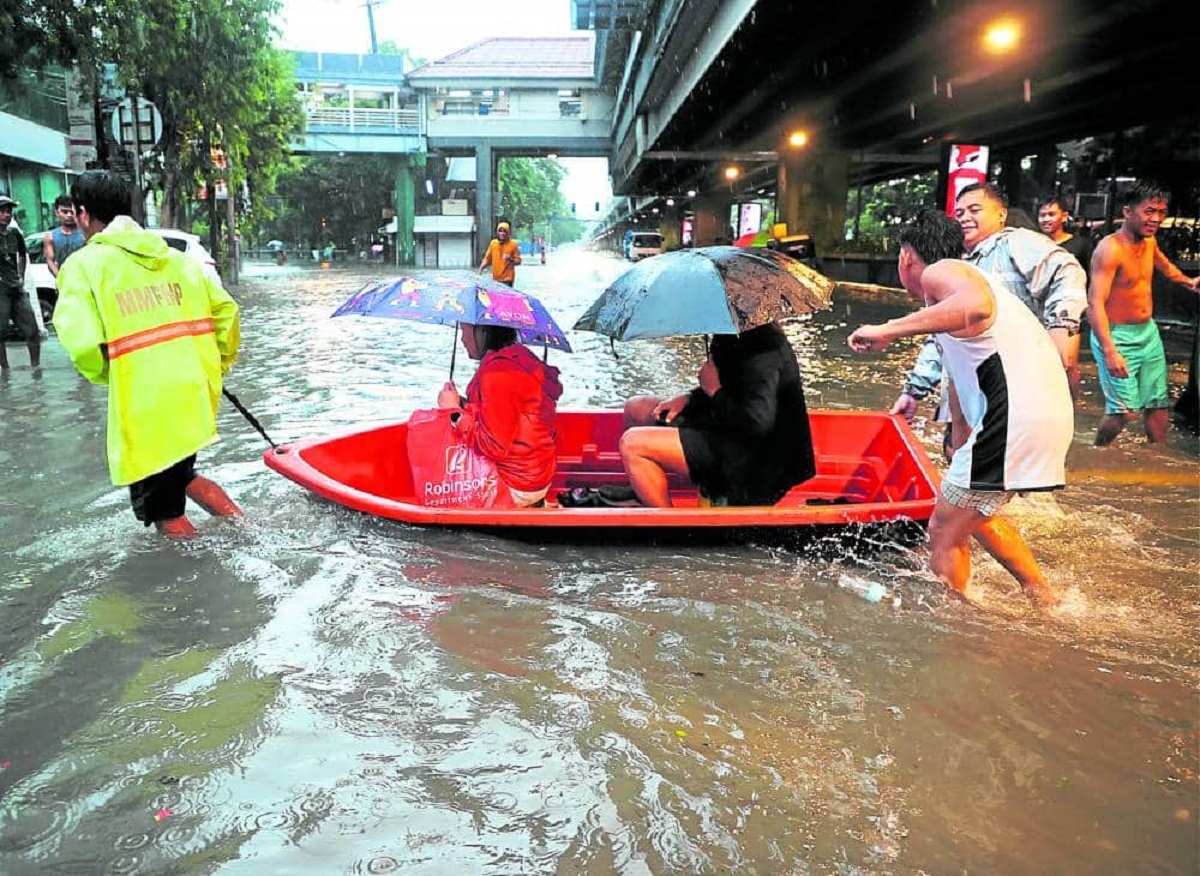
Floods are made more likely by the more extreme weather patterns caused by long-term global climate change. —Marianne Bermudez
MANILA, Philippines — With worsening weather events threatening the Philippines, one of the country’s giant conglomerates is in for a serious fight against climate change, and in firm partnership with the public sector.
Zobel family-led Ayala Corp. is stepping up its presence in such efforts by signing an agreement with the Climate Change Commission (CCC) to pursue the integration of corporate and public sector initiatives. The CCC serves as the government’s lead policymaking body on climate change.
The Ayala Group’s footprint is spread across various key industries, such as banking, telecommunications, energy and property. With its influence and financial muscle, the CCC sees the conglomerate’s participation as a model for the private sector as it plays a “crucial role” in easing the impact of climate change on local communities.
READ: Champion of sustainability: ALI charting a path to ‘zero’
“Extreme weather events are hitting us harder, so it is important, as the President says, to be better prepared… We need partnerships that translate these plans into actions with deep impact. The private sector plays a crucial role in helping us move faster and better through pragmatic work programs,” said CCC Vice Chair and Executive Director Robert Eric E.A Borje.
A report issued in December 2023 by the Asian Development Bank warned that the Philippines is among the nations “most vulnerable to the impact of climate change.”
‘Most aggressive agent’
President Marcos has also stressed the role of businesses in addressing climate change, calling the sector the “most aggressive agent of change in our society.” Marcos urged companies to set their eyes not just on profits but also on sustainable development projects, such as shifting to renewable energy.
ESG—which stands for environmental, social and governance—promotes responsible investments and initiatives that focus on environmental and social issues, as well as corporate governance.
Michael Ricafort, chief economist at Rizal Commercial Banking Corp., said regulators here and abroad have been encouraging investors “to patronize companies and governments that comply with ESG standards, since compliance with ESG standards signals good business practices and overall business standards.”
For Jaime Urquijo, chief sustainability officer of Ayala Corp., the group is fully on board with the government in pushing for ESG.
“The potential outcomes of this collaboration are crucial for our collective efforts in combating climate change,” he said.
Among the Ayala Group’s ESG programs is its target to achieve net zero by 2050. To this end, Ayala’s renewable energy arm ACEN is ramping up projects to grow its capacity to 20 gigawatts by 2030, with key projects such as a 500-megawatt solar plant in Zambales and several wind farms in Ilocos Norte.
For 2024 alone, ACEN is investing P72 billion to accelerate its stake in renewables.
Real estate arm Ayala Land Inc. (ALI) has also been making conscious efforts to reduce its emissions.
“ALI is working with our supply chain to abate most of our emissions and has been nurturing seven private forest carbon projects covering more than 700 hectares all over the country to remove 10 percent,” said Anna Maria Gonzales, sustainability head of ALI.
Meanwhile, the government’s Green Energy Option Program (GEOP), which allows customers consuming an average peak demand of 100 kilowatts to source their power from renewable energy, has been gaining traction among locators in special economic zones.
According to Alberto Dalusung III, energy transition adviser of the Institute for Climate and Sustainable Cities, the key to these businesses’ shift has been the fiscal benefits of the program, since GEOP doesn’t charge value-added tax (VAT) in the generation, transmission and distribution of power, unlike the additional 12 percent VAT from fossil fuels.
“[GEOP switchers] are not subject to international fuel prices. Renewable energy will likely not have the same fluctuations [as coal],” Dalusung said.
Laguna’s Seda Nuvali, for instance, transitioned its one tower to GEOP in 2022, leading to the hotel’s lower power bills.
The Department of Energy’s campaign “Choosing Renewables” will also run in Tacloban City, Bacolod City and Cagayan de Oro City.
Climate action plan
CCC’s Borje said the agency would focus on planning and adaptation strategy implementation, particularly at the grassroots level.
The National Adaptation Plan serves as a guide for adaptation strategies, focusing on addressing the impacts of climate change on vulnerable communities.
The Nationally Determined Contributions Implementation Plan, on the other hand, aims for a 75-percent reduction in greenhouse gas emissions in sectors such as agriculture, waste, industry, transportation and energy.
As a country struck by an average of 20 storms annually, the Philippines frequently endures widespread flooding and other weather-related hazards.
The Marcos administration has vowed to build more dams and flood-control projects. Under this year’s budget, the government allotted P457.4 billion for climate change expenditures, slightly higher than the P453 billion earmarked in 2023.
The budget is distributed as follows: P244.6 billion for flood management program; P20.5 billion for the national disaster risk reduction and management fund; and P2.4 billion for the development and management of protected areas.

